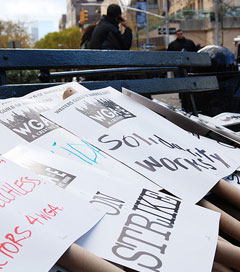Recent ideologically-driven attacks on collective bargaining have inspired a national conversation about the role of organized labor in 21st Century America.
The headlines have focused on teachers and other public employees, on whether it is unseemly for people who work for the government to assert any rights on the job. But the same hard-right forces that want to wipe out public sector unions oppose the very idea that employees can band together to advance their own interests. There are so many ways to rebut the shrill complaints about organized labor – so many good things unions have done for the average American over the course of decades. But perhaps this is a good opportunity for us to take stock of ourselves, to examine where we are today and what we might need to do to remain relevant in the future.
Less than ten percent of the private sector workforce in this country is unionized. The percentage is significantly higher in the public sector – which might explain why billionaires like the Koch brothers are financing the political attacks on unions that represent government employees. Union density is at or below pre-New Deal levels. Much of the decline has been due to concerted corporate attacks on the right of employees to engage in collective action, but a lot of it is the result of the hollowing out of heavily-unionized industries such as steel, auto, consumer durables (refrigerators and so on), printing, and related sectors. Millions of jobs have been lost to imports and technological change. Construction of large projects in major urban areas remains heavily unionized but the Great Recession put most projects on hold, costing hundreds of thousands of good union jobs.
Manufacturing and other unionized industries will probably rebound, at least to some extent, but presumably not to their former levels. I think we should assume that the post-World War II model in which very large numbers of employees toiled in very large facilities to make physical goods like cars and washing machines, and in which a union’s task was to harness the collective power of those employees to muscle better wages and working conditions, is unlikely to be dominant in the future. Instead, vast numbers of Americans will be, to some extent, knowledge workers. That is, people who work directly with information rather than with stuff. I do not have the wisdom to proclaim whether a national economy can be sustained on the basis of moving around pieces of paper representing capital, or on the basis of creating and selling innovative ideas without actually making physical products. But I do think the economy will be based on services for quite some time.
The Writers Guild of America, East knows how to represent knowledge workers. To some extent our members are the ultimate knowledge workers. What they build is stories for television, radio, movie screens, and the internet. They write drama and comedy and news and documentaries. For most, employment is contingent, job-to-job, script-to-script, show-to-show. And, except for our newswriter members, they work in small shops or in the solitude of their own homes. In our news shops technology is transforming the way the work gets done, and more and more of the jobs are “temporary”. Most of the employers with whom we bargain are huge multinational conglomerates. In other words, our members already know what it’s like to survive as contingent knowledge workers in the Brave New Economy.
I think our success rests on our ability to be both a traditional, militant union whose members are willing and able to strike and, at the same time, a guild that offers a sense of community and professional solidarity. Both are important. We are very good at negotiating and enforcing collective bargaining agreements (although the Great Recession and the transformation of some parts of our industry have made this more challenging than ever). Members like being part of the Writers Guild both because it fights for their interests and because it demonstrates that they have achieved a level of creative success. It links them to other people with a passion to tell stories, to present news and public affairs in reliable and compelling ways, to make people laugh or cry or think. The Guild is part of our members’ identity as writers, creators. We present many events that speak to this aspect of the union and its members’ work – screenings, panel discussions about the economics of digital media or the craft of screenwriting, screenplay readings, training in the latest technologies or in creating in specific genres. All of these activities (bargaining, socializing, learning) weave together into a coherent whole. Into a union/guild that people care about.
Our status as a community of creators helps us organize the unorganized. Non-Guild writers know who we are and what our members do, and most are eager to join. Current members participate actively in meetings with people who work for non-union companies, and they bring enormous credibility to our organizing efforts. Of course, persuading employers to recognize the union and to pay their writers more is far from easy, and the contingent, job-to-job nature of writing employment makes organizing inherently more difficult than in the old-school mega-factory (where, truth be told, organizing is difficult for a whole different set of reasons). But the fact we function as both a hard-bargaining trade union and a guild of professional creators is of great benefit as we seek to expand the number of writers and creators doing Guild-covered work.
Perhaps the WGAE approach might be a model for representing people who think and create for a living – which is to say millions of Americans. We engage our members’ work lives, even though their workplaces are small and scattered and their jobs are often of short duration, and we engage their artistic, intellectual, and social interests. Thus, we are able to build professional and economic solidarity even in the absence of large worksites which foster a lot of day-in, day-out contact between workers.
